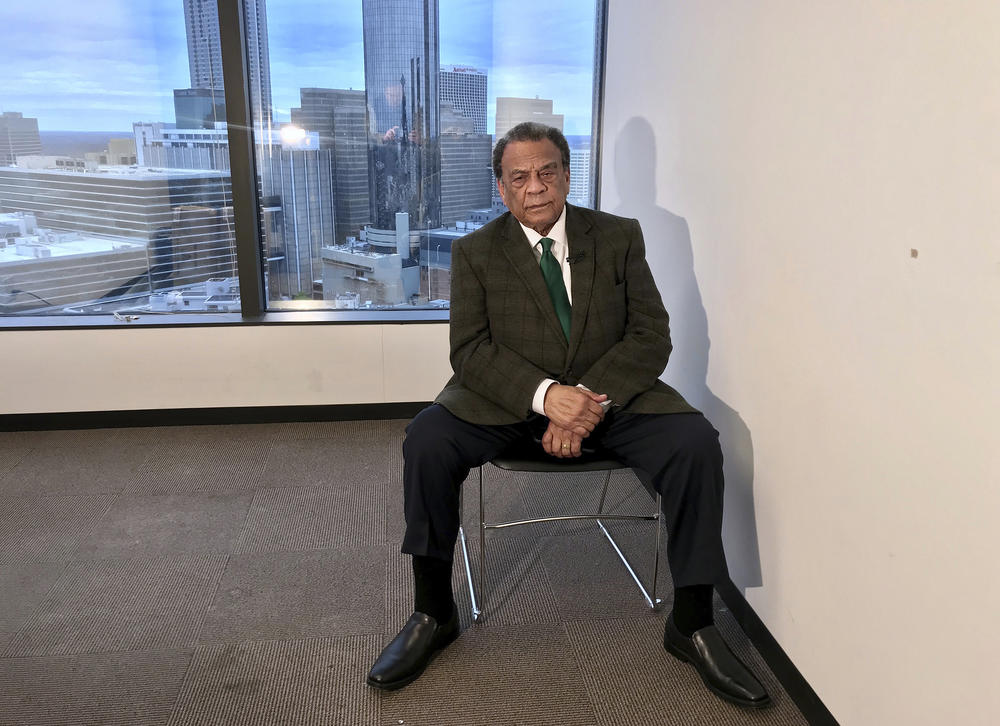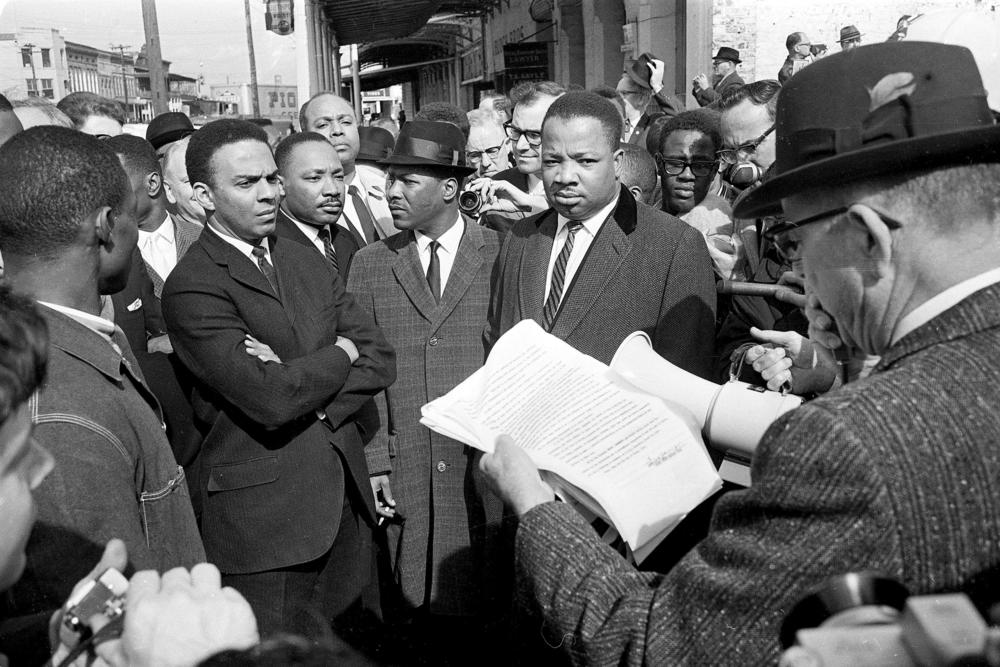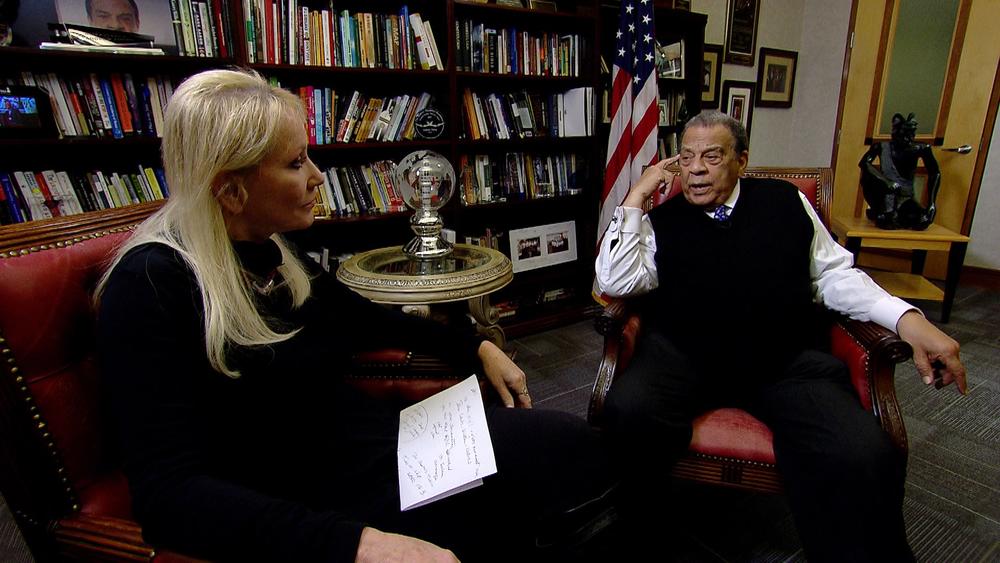Section Branding
Header Content
Andrew Young Speaks On Legacy Of Civil Rights Movement In New GPB Documentary
Primary Content
GPB-TV has a new documentary about civil rights leader and former ambassador Andrew Young.
Young was a close ally of Dr. Martin Luther King Jr. He went on to represent Atlanta in Congress. He was President Jimmy Carter's ambassador to the United Nations. And in the 1980s, Andrew Young served as Atlanta's mayor.
GPB's film profiling Andrew Young is hosted and produced by Sharon Collins. GPB's Rickey Bevington spoke to Collins about her experience sitting down with the icon.
This conversation has been edited for clarity and conciseness.
Rickey Bevington: There's a moment in this film when Ambassador Young surprises you.
Sharon Collins: He's talking about the march from Selma. I'm watching his documentary, which he allowed me to use clips from. People are being beaten over the head, women thrown to the ground. It was so violent. They called it "Bloody Sunday." He was just so matter of fact about it. I mean, they had clubs and tear gas. I was horrified by the violence.
Bevington: Let's hear part of that conversation.
Andrew Young: It wasn't as bad as it looked.
Collins: How can you say that? It was horrible!
Young: I know, but I don't think anybody stayed in the hospital more than a day compared to St. Augustine. In St. Augustine, our hospital bills were higher than our bond bills because people really got beat up.
Bevington: What does he mean by that?
Collins: A lot of people don't know about St. Augustine. There were multiple marches at night and a judge ruled that, yes, they could march at night, but they were attacked. Klansmen were very much involved.
At one point, he was walking and leading the march. You know, Andrew Young is Andrew Young. He thought, "Let me step across the street and and reason with these people, so that they won't hurt us." Of course, they beat him and kicked him to the ground.
They were beaten trying to go to the beach. There were multiple marches. What he means is that they had injuries so severe that they had to be in the hospital for a much longer period than the Selma injuries.
Bevington: It must be surreal, as a journalist, Sharon, to interview someone who has risked their life so many times that the terror of being killed is becomes relative.
Collins: He says Martin Luther King prepared them for death. They laughed at death. He says, "Martin would preach us to heaven and talk and crack on us all the time and make jokes, so that we actually were laughing about our own deaths."
But it is surreal because I'm not sure, in this day and age, there would be a movement where people were willing to just give their lives like that.
Bevington: Young has lived through so much history, and yet he also told you that he doesn't think the civil rights movement is over. Let's hear that clip.
Young: The civil rights movement can never be over because there will always be change. The #MeToo movement is part of the civil rights movement. The gay rights movement. I'm waiting for poor white men to start a movement.
Bevington: That's an incredible statement. Why does Young believe poor white men are a future civil rights movement?
Collins: It's not just poor white men, but poor white men between the ages of 40 and 60. He says they are dying faster than any other demographic in our nation. I checked him, and a lot of it is health care, lack of jobs, diabetes, things like that. And he said it used to be when you got out of World War Two, you got the G.I. Bill. You could say, "I'm a white man, so I'm okay."
What he's saying is, today, not so much. A lot of them are hurting. He feels like that's probably the next movement.
Bevington: What was your exposure to the civil rights movement as a child?
Collins: I knew nothing about it as a child, except when we took a family trip to Florida. They had a sign on the bathroom doors: Whites and Coloreds. So as a little girl, I ran to the coloreds room because I thought that one will be pretty and it'll have lots of colors in it. My mom was freaking out. She grabs me by the arm, and we get in the car.
I didn't understand, so I'm asking mom and dad all these questions, and they're trying to evade me because how do you tell a little kid about why there are white signs over one door and colored sign over another door? That was pretty much my exposure.
Now, I knew when Martin Luther King was assassinated, everybody was really sad. There was tension. My parents were glued to the television and concerned, but that's relatively all I know.
I hope that if if I didn't know this, think of the millions of young people who don't know anything about it. I hope they see.
GPB-TV's documentary is called "Andrew Young: A Moment in Time."




